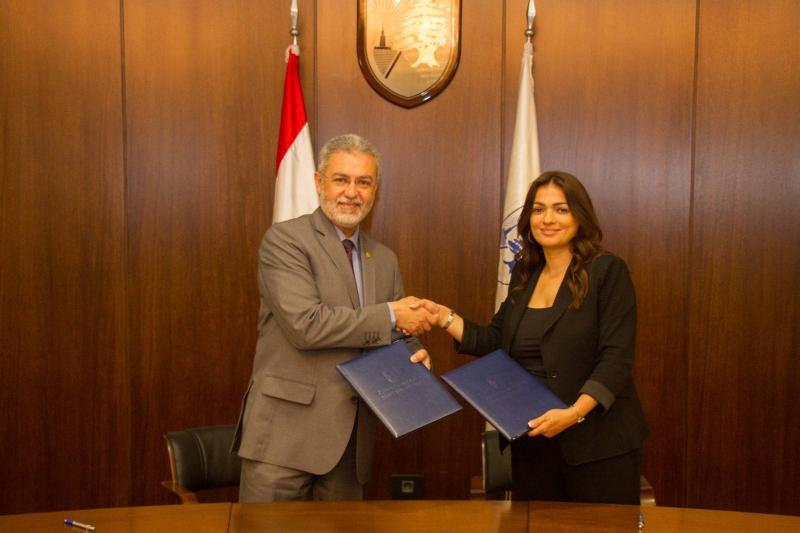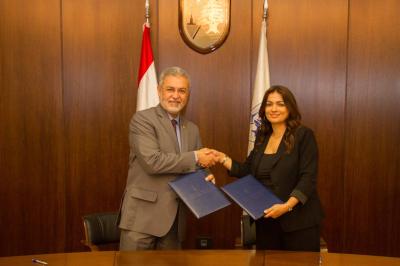Under the patronage of His Highness Sheikh Dr. Sultan bin Muhammad Al Qasimi, Ruler of Sharjah, and the President of Beirut Arab University, Professor Wael Nabil Abdel Salam, the Faculty of Humanities, under the supervision of Dean Professor Sadiqa Lashin, organized a seminar titled "What Comes After the Historical Dictionary of the Arabic Language." The objective was to benefit from the historical dictionary in the fields of philology, the history of the language, and language study, as this dictionary will facilitate access to the correct meanings of sentences and translate them more accurately, especially when the text is linked to a specific historical period; at that point, programs will be able to provide precise meanings for each term in its historical context.
The seminar began with the Lebanese national anthem, followed by remarks from President Abdel Salam, who stated, "In recent years, the field of historical lexicography has witnessed significant progress due to advancements in computer technology and the availability of vast amounts of digital textual data, allowing lexicographers to create more comprehensive and accurate historical dictionaries than ever before." He continued, "The university offers a wide range of academic programs in the Arabic language, including bachelor's, master's, and doctorate degrees, adopting a multidisciplinary approach to teaching Arabic that combines linguistic, literary, historical, and cultural studies."
For her part, Dr. Sara Dahir, President of the Arabic Language Academy in Lebanon, noted, "This seminar follows the launch of the historical dictionary of the Arabic language, initiated by His Highness Sheikh Sultan bin Muhammad Al Qasimi, Ruler of Sharjah, and President of the Arabic Language Academy in Sharjah, alongside efforts by its Secretary-General, Professor Muhammad Safi Al-Mustghanami, and a team of over 800 individuals; it is a historic achievement that contributes to documenting and analyzing the evolution of our Arabic language through the ages."
In a remote speech, Professor Muhammad Safi Al-Mustghanami, Executive Director of the historical dictionary, stated, "The historical dictionary was once a distant dream and a sought-after hope, but it is now in our hands. This dictionary is a resurgence of the second conjoining of the Arabic language in which many scholars, researchers, and experts participated, initiated by His Highness Sheikh Sultan bin Muhammad Al Qasimi. We are presented with a unique opportunity to promote the culture of the Arabic language and enhance our Arab identity through this historical dictionary."
Professor Wafi Salahuddin Haj Majid, Head of the Department of Arabic Language and Literature at the International University in Beirut and a member of the Arabic Language Academy in Damascus, remarked, "This dictionary, with its historical dimension and unique methodology, opens important research windows into linguistic sciences from a historical and comparative perspective, enriching the material of serious research within it."
Dr. Samir Aitani, Assistant Professor in the Department of Arabic Language and Literature at the university, stated that "this dictionary can also benefit literary studies and their development due to the abundant evidence it contains, which almost encompasses everything said on the subject being researched. When this dictionary is completed, it will be a comprehensive record for Arabs regarding their lexicographical knowledge linguistically, literarily, and socially." The seminar concluded with remarks from Dr. Noor Marai, a university professor, emphasizing that "returning to the historical dictionary is a civilizational necessity that honors our mother language and meets the demands of our reality."
The participants then came out with the following recommendations: expanding the scope of research, applying modern technology, raising awareness and promotion, international cooperation, enhancing Arab identity and belonging, continuing lexicographical work through a suggestive dictionary of Arabic words, linking the historical dictionary to a geographical map that serves as a starting point for software, and directing graduate students, doctoral candidates, and researchers in general to derive research from the historical dictionary across various fields.
On the sidelines of the seminar, Professor Wael Nabil Abdel Salam, President of Beirut Arab University, signed a three-year agreement with Dr. Sara Salem Dahir, President of the Arabic Language Academy in Lebanon, aimed at establishing cultural, scientific, and educational cooperation between the university and the academy in the field of Arabic language teaching and student evaluation.




